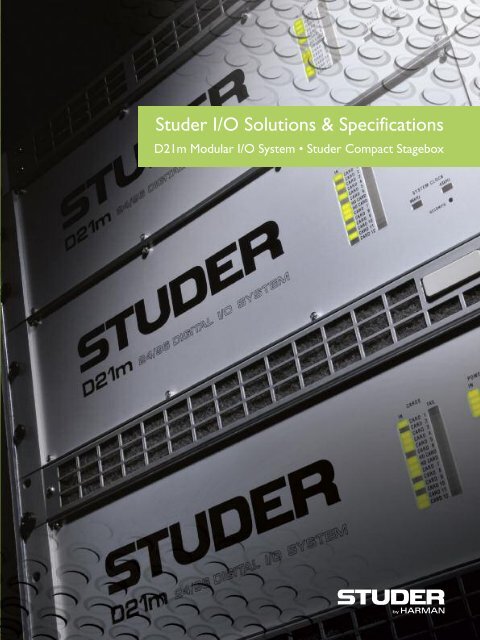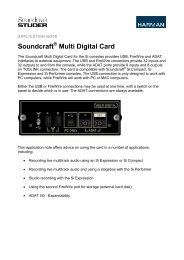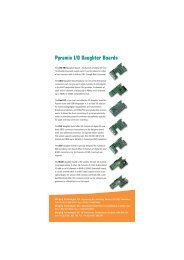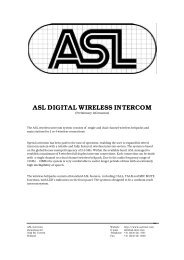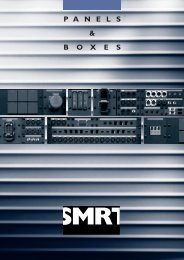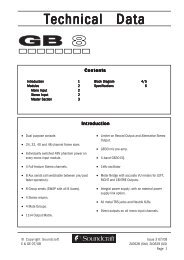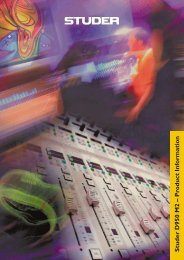Studer I/O Solutions & Specifications
Studer I/O Solutions & Specifications
Studer I/O Solutions & Specifications
Create successful ePaper yourself
Turn your PDF publications into a flip-book with our unique Google optimized e-Paper software.
<strong>Studer</strong> I/O <strong>Solutions</strong> & <strong>Specifications</strong><br />
D21m Modular I/O System • <strong>Studer</strong> Compact Stagebox
System I/O<br />
2 Stageboxes
<strong>Studer</strong><br />
I/O Systems<br />
Front<br />
Back<br />
<strong>Studer</strong> D21m I/O System<br />
The D21m I/O system provides very cost-effective inputs and<br />
outputs with maximum flexibility while maintaining the well-known<br />
<strong>Studer</strong> sound quality, available in full 96 kHz operation.<br />
Different I/O modules can be plugged into a frame, providing I/O<br />
systems tailor-made to customer needs. And all this comes with an<br />
unequalled form factor. Full redundancy is available starting from<br />
power supplies going up to redundant interconnections and DSP<br />
cards.<br />
When using the D21m I/O system the DSP core itself does not<br />
provide I/O, but is connected to the first D21m frame within the<br />
system (acting as a hub) by using <strong>Studer</strong> proven ‘HD Link’<br />
technology. At the DSP core side, the connection is made directly to<br />
the DSP card(s). From that frame it is possible to run optical-fiber<br />
MADI links to multiple places, up to several kilometres away. A<br />
maximum of six remote I/O boxes (stage boxes) may be connected<br />
to one hub frame.<br />
Should more I/O channels be required then multiples of the ‘local<br />
frames’ (hubs) may be used within the system.<br />
D21m Stageboxes<br />
The D21m frames may also be housed in custom flightcases and<br />
used as portable remote stageboxes, with convenient<br />
multiway cable links and<br />
break-out panels.<br />
<strong>Studer</strong> Compact Stagebox<br />
The Compact Stagebox adds a cost-effective expansion option,<br />
offering a high density of I/O connections in only 4U of rack space.<br />
The modular unit is fully configurable but is offered with a standard<br />
configuration of 32 mic/line inputs and 16 line outputs. It is possible<br />
to equip the Compact Stagebox with an additional 16 mic/line input<br />
module instead of the output module, then providing 48 inputs. In<br />
this case, analogue or AES/EBU outputs can still be obtained on D-<br />
Type connectors via D21m cards fitted to the expansion slots.<br />
Redundancy<br />
Redundancy issues are regarded as highly important, so it is possible<br />
to run any MADI links with redundant cables. The system<br />
automatically switches to the redundant connection in case the<br />
primary connection fails. For 96 kHz operation the second link can<br />
be used as a channel count extension, transferring a total of 64<br />
MADI channels even at a 96 kHz sampling rate. The ‘redundant’<br />
MADI link may also be used for sharing an I/O box between two<br />
consoles.<br />
The following pages give an overview of all optional cards for the<br />
D21m slots, together with technical specifications and details on the<br />
I/O on the Compact Stagebox and its specifications.<br />
Full installation and user details may be found in the <strong>Studer</strong> D21m<br />
Operating Instructions, available on the <strong>Studer</strong> website,<br />
www.studer.ch.<br />
www.studer.ch 3
D21m Modules<br />
Name<br />
I/O<br />
Format<br />
# of Console<br />
Input Channels<br />
# of Console<br />
Output Channels<br />
Connector<br />
Type<br />
Width<br />
(Slots)<br />
Order No.<br />
Analogue I/O Cards<br />
*Mic/Line Input (incl. Dir. Outs) Mic/Line 4 (4 Dir. Outs) D25f single A949.0427 6<br />
*Analogue Insert Line 4 4 D25f single A949.0428 6<br />
*HD Mic/Line Input with Input<br />
Transformers (incl. Dir. Outs)<br />
Mic/Line 4 (4 Dir. Outs) D25f single A949.0447 6<br />
Analogue Line In Line 8 - D25f single A949.0421 6<br />
Analogue Line Out Line - 8 D25f single A949.0420 6<br />
Digital I/O Cards<br />
AES I/O M1 (no SRCs) AES/EBU 8 stereo (16 mono) 8 stereo (16 mono) 2 x D25f double ** A949.0422 7<br />
AES I/O M1 (Input SRCs) AES/EBU 8 stereo (16 mono) 8 stereo (16 mono) 2 x D25f double ** A949.0423 7<br />
AES I/O M1 (In/Out SRCs) AES/EBU 8 stereo (16 mono) 8 stereo (16 mono)<br />
Intercom BNC<br />
Intercom Sub-D<br />
MADI I/O ***/****<br />
AES<br />
AES<br />
MADI<br />
4 stereo<br />
4 stereo<br />
64 at 48kHz<br />
(32 with red., 64<br />
without red. at 96kHz)<br />
4 stereo<br />
4 stereo<br />
64 at 48kHz<br />
(32 with red., 64<br />
without red. at 96kHz)<br />
2 × D25 f;<br />
ext. sync XLR<br />
4 × BNC<br />
D25 f<br />
SC (optical)<br />
SC (optical)<br />
2 × RJ45<br />
Page<br />
double ** A949.0424 7<br />
single<br />
single<br />
double **<br />
5037475<br />
5037474<br />
A949.0430<br />
A949.0431<br />
A949.0433<br />
9<br />
7<br />
ADAT I/O<br />
ADAT<br />
16 at 48kHz<br />
(8 at 96kHz)<br />
16 at 48kHz<br />
(8 at 96kHz)<br />
TOSLINK<br />
(optical)<br />
single<br />
A949.0425<br />
A949.0429<br />
7<br />
TDIF I/O<br />
TDIF<br />
16 at 48kHz<br />
(8 at 96kHz)<br />
16 at 48kHz<br />
(8 at 96kHz)<br />
2 x D25f double ** A949.0426 7<br />
3G/HD/SD SDI Input 3G/SD/HD 8/16 - 2 × BNC single A949.0452 8<br />
3G/HD/SD SDI I/O 3G/SD/HD 8/16 8/16 4 × BNC single<br />
Dolby® E/Digital Decoder<br />
AES/EBU<br />
8<br />
16<br />
2 stereo (4 mono)<br />
4 stereo (8 mono)<br />
D15 f<br />
single<br />
A949.0451<br />
A949.0457<br />
A949.0443<br />
A949.0444<br />
CobraNet® I/O CobraNet 32 32 2 × RJ45 single A949.0445 9<br />
Aviom A-Net® Output A-Net - 16 RJ45 single A949.0446 9<br />
EtherSound® I/O *** EtherSound 64 64 3 × RJ45 double ** - 9<br />
RockNet 48 48 double ** 10<br />
Axia Livewire TM 32 32 2 x RJ45 single 5014376 10<br />
BCD DTMF Dec./Glits Gen. Internal 16 8 - single - 10<br />
BCD Blits/Glits Gen. Internal - 8 - single - 10<br />
BCD Minimixer<br />
Internal<br />
16 (with GP inputs)<br />
32 (without GPIO)<br />
16<br />
32<br />
-<br />
single<br />
single<br />
-<br />
-<br />
8<br />
9<br />
10<br />
4 Stageboxes
Name<br />
I/O<br />
Format<br />
# of Console<br />
Input Channels<br />
# of Console<br />
Output Channels<br />
Connector<br />
Type<br />
Width<br />
(Slots)<br />
Order No.<br />
GPIO Cards<br />
GPIO w. Open-Collector Outp. GPIO 16 16 2 × D25 f double ** A949.0435 10<br />
GPIO w. Relay Outputs GPIO 16 16 2 × D37 f double ** A949.0436 10<br />
HD Cards<br />
HD S HD Link max. 192 max. 192 4 × RJ45 single A949.0412 11<br />
HD RS422<br />
MADI HD<br />
Serial / Merger Cards<br />
HD Link +<br />
RS422<br />
MADI<br />
max. 192 max. 192 4 × RJ45, D9 f double ** A949.0415 11<br />
64 at 48kHz<br />
(32 with red., 64<br />
without red. at 96kHz)<br />
64 at 48kHz<br />
(32 with red., 64<br />
without red. at 96kHz)<br />
SC (optical)<br />
SC (optical)<br />
RJ45<br />
double **<br />
A949.0411.3x<br />
A949.0413.3x<br />
A949.0414.3x<br />
Serial RS422 - - D9 f single A949.0437 12<br />
Serial Merger RS422 - - 2 x D9 f single A949.0438 12<br />
Serial RJ45 RS422 - - RJ45 single A949.0439 12<br />
Dual Merger RJ45 RS422 - - 4 x RJ45 single A949.0440 12<br />
Page<br />
11<br />
Compact Stagebox Modules<br />
Name<br />
I/O<br />
Format<br />
# of Console<br />
Input Channels<br />
# of Console<br />
Output Channels<br />
Connector<br />
Type<br />
Order No.<br />
HQ Mic/Line Input Module Mic/Line 16 0 XLR 5032172 12<br />
Line Output Module Line 0 16 XLR 5023745 12<br />
AES/EBU Input/Output Module AES/EBU 8 x 2Ch<br />
8 x 2Ch<br />
with SRC<br />
XLR 5019847 12<br />
Line/AES Output Module AES/EBU/Line 0<br />
8 analogue<br />
4 x 2Ch AES/EBU<br />
XLR A.947.043700 12<br />
Page<br />
* The Analog Insert card is fitted to the left of the Mic/Line Input card A949.0427. The insert send signal is always present and may be used as<br />
an additional direct output. The insert return is activated from the console.<br />
Please note that the Analog Insert card does not communicate with the HD card, and it is not supported by the HD Mic/Line Input card A949.0447.<br />
** Double-width cards must be inserted into odd slot numbers (e.g. slots 1, 3, 5…).<br />
*** The number of channels transmitted to and from a card may be defined in steps of 8 channels by using DIP switches on the card.<br />
**** Regardless of the number of channels defined with the DIP switches, a switch on the front panel switches the MADI protocol between the<br />
standard 56-channel format and the extended 64-channel format. Therefore this switch may have to be set to ‘56 channel’ protocol in order<br />
to operate correctly with third party MADI devices. In this case the number of channels set internally should not exceed 56.<br />
www.studer.ch 5
Analogue I/O Cards<br />
Mic/Line In Card<br />
A949.0427<br />
Four analog microphone/line inputs, electronically balanced, with<br />
24bit, 44.1/48/88.2/96kHz delta-sigma A/D converters. Four<br />
analog split outputs, electronically balanced. Mic/line sensitivity,<br />
gain setting in 1dB steps, lowcut filter, soft clipping and 48 V<br />
phantom power on/off are controlled by the console software.<br />
Input sensitivity (for 0dB FS )<br />
–60…+26dBu<br />
Input impedance<br />
1.8kΩ<br />
Split out gain (input sensitivity –60…+3dBu) 0dB<br />
(input sensitivity +4…+26dBu) –20dB<br />
Split out impedance<br />
50Ω<br />
Equivalent input noise (Ri 200Ω, max. gain) –124dBu<br />
Crosstalk (1 kHz)<br />
< –110dB<br />
Frequency response (30 Hz-20 kHz)<br />
–0.2dB<br />
THD&N (1kHz, –1dB FS ) < –97dB FS<br />
(20Hz-20kHz, –30dB FS )<br />
< –111dB FS<br />
CMRR (30Hz-20kHz, all gain settings) > 55dB<br />
(1kHz, input sensitivity –10 to<br />
+26dBu for 0dB FS )<br />
typ. 100dB<br />
Low-cut filter<br />
75Hz / 12dB/oct.<br />
Input delay (local) 38 samples (0.79ms @ 48kHz)<br />
(remote) 45 samples (0.94 ms @ 48kHz)<br />
Current consumption (7V) 0.2A<br />
(±15V) 0.25A<br />
Operating temperature<br />
0-40°C<br />
Analog Insert Card<br />
A949.0428<br />
This card is intended for use with a D21m Mic/Line In card<br />
(A949.0427) and features four electronically balanced analog<br />
inserts. The insert sends are always active, return on/off is<br />
controlled by the console software (default off). Insert sends<br />
and returns on standard 25-pin D-type connector (female).<br />
In/out level (for 0dB FS )<br />
15dBu<br />
(6 or 24dBu w. soldering jumper)<br />
Input impedance<br />
10kΩ<br />
Output impedance<br />
50Ω<br />
Current consumption (±15V) 0.05A<br />
Operating temperature<br />
0-40°C<br />
HD Mic/Line In Card<br />
A949.0447<br />
Four analog microphone/line inputs, transformer-balanced, with 24-bit, 44.1/48/88.2/96 kHz delta-sigma A/D converters. Four analog split outputs,<br />
electronically balanced. Mic/line sensitivity, gain setting in 1 dB steps, hi-pass filter, soft clipping and 48 V phantom power on/off are controlled by the<br />
console software. Inputs and split outputs on a standard 25-pin female D-type connector (female).<br />
As opposed to the Mic/Line Input card A949.0427, the gain of the split outputs is always unity, i.e., 0 dB. This card does not support the Analog Insert Card<br />
A949.0428.<br />
Input sensitivity (for 0 dB FS )<br />
–60…+26 dBu<br />
Input impedance<br />
2.2 kΩ<br />
Split out gain<br />
0 dB<br />
Split out impedance<br />
100 Ω<br />
Equivalent input noise (Ri 200 Ω, max. gain)<br />
–124 dBu<br />
Crosstalk (1 kHz)<br />
< –110 dB<br />
Frequency response (30 Hz-20 kHz)<br />
–0.2 dB<br />
THD&N (1 kHz, input level –6 dBu) < –88 dB<br />
(40 Hz-20 kHz, input level –30 dBu) < –100 dB<br />
CMRR (30 Hz-20 kHz, all gain settings)<br />
> 60 dB<br />
High-pass filter<br />
75 Hz, 12 dB/oct.<br />
Input delay (local) 38 samples (0.79 ms @ 48 kHz)<br />
(remote)<br />
45 samples (0.94 ms @ 48 kHz)<br />
Current consumption (7 V) 0.2 A<br />
(±15 V) 0.25 A<br />
Operating temperature 0-40 °C<br />
Line In Card<br />
A949.0421<br />
Eight-channel line input card with 24-bit, 44.1/48/88.2/96kHz<br />
A/D Converter, delta-sigma conversion. Transformer-balanced<br />
inputs. 96kHz, 88.2kHz, 48 kHz, or 44.1 kHz operation. 7-26dBu<br />
input sensitivity. ‘Signal present’ LED indicator. Inputs on standard<br />
25-pin female D-type connector.<br />
Input level (for 0 dB FS ) 15/24 dBu (fixed, jumper-selectable),<br />
or 7-26 dBu (adjustable)<br />
Input impedance<br />
> 10kΩ<br />
Frequency response (20Hz-20kHz)<br />
–0.2dB<br />
THD&N (35 Hz-20 kHz, –1 dBFS, 15dBu setting) < –97dB FS<br />
(1 kHz, –30dBFS, 15dBu setting) < –111dB FS<br />
Crosstalk (1kHz)<br />
< –110dB<br />
Input delay (local) 38 samples (0.79ms @ 48kHz)<br />
(remote) 45 samples (0.94ms @ 48kHz)<br />
Current consumption (7V) 0.42A<br />
(±15V) 0.1A<br />
Operating temperature<br />
0-40°C<br />
Line Out Card<br />
A949.0420<br />
Eight-channel, 24 bit line output card with 24-bit D/A converters<br />
with 96 kHz, 88.2 -kHz, 48 -kHz, or 44.1kHz operation.<br />
Electronically balanced outputs. 7…26 -dBu max. output level.<br />
Outputs on standard 25-pin female D-type connector.<br />
Output level (for 0dB FS ) 15/24dBu (fixed, jumper-selectable),<br />
or 7-2 dBu (adjustable)<br />
Output impedance<br />
40Ω<br />
Min. load (at +24dBu)<br />
600Ω<br />
Frequency response (20Hz-2kHz)<br />
–0.2dB<br />
THD&N (20Hz-20kHz, –1dB FS , jumper at 15dBu fixed) < –90dB FS<br />
(1kHz, –30 dB FS , jumper at 15dBu fixed) < –110dB FS<br />
Crosstalk (1 kHz)<br />
< –110dB<br />
Output delay (local)<br />
28 samples (0.58ms @ 48kHz)<br />
(remote) 32 samples (0.67ms @ 48kHz)<br />
Current consumption (7V) 0.23A<br />
(± V) 0.25A<br />
Operating temperature<br />
0-40°C<br />
6 Stageboxes
Digital I/O Cards<br />
AES/EBU M1 Cards<br />
A949.0422, A949.0423, A949.0424<br />
AES/EBU input/output card with 16 Ch I/O, available in 3 different<br />
versions:<br />
A949.0422xx<br />
A949.0423xx<br />
A949.0424xx<br />
without SRCs (Sampling Rate Converters;<br />
Vista only)<br />
with input SRCs only<br />
with input and output SRCs<br />
(see adjacent picture).<br />
Selectable output sampling rates: 96 kHz, 48 kHz, 44.1 kHz, or external<br />
reference (22-108 kHz).<br />
Input / output impedance<br />
110Ω<br />
Input sensitivity<br />
min. 0.2 V<br />
Output level (into 110Ω)<br />
4.0 V<br />
THD + noise<br />
max. –115dB<br />
SRC range<br />
22-108kHz<br />
Current consumption<br />
(3.3V) A949.0454: 0.43 A/.0455: 0.67 A/.0456: 0.94A<br />
(5V) 0.45A<br />
Operating temperature<br />
0-40°C<br />
MADI I/O Cards<br />
A949.0430, A949.0431, A949.0433<br />
A949.0430xx<br />
A949.0431xx<br />
A949.0433xx<br />
The MADI I/O cards can establish a 64-channel<br />
MADI input and output to the D21m frame, with<br />
44.1/48/88.2/96 kHz operation. Three different<br />
versions are available:<br />
A949.0430xx Optical / multi-mode fibre<br />
A949.0431xx Optical / single-mode fibre<br />
A949.0433xx Cat5e twisted-pair (+<br />
additional word clock out).<br />
Optical inputs and outputs are provided on SC<br />
connectors. The Cat5e version with RJ45<br />
connectors for twisted-pair cable features an<br />
additional word clock output on a BNC socket.<br />
The auxiliary interface can be used as a redundant<br />
link or, in 96 kHz operation, to extend the number<br />
of channels from 32 back to 64.<br />
Max. cable length (A949.0430, multi-mode fibre, wavelength<br />
1300nm*, ø either 62.5 or 50μm)<br />
2km<br />
(A949.0431, single-mode fibre, wavelength<br />
1300 nm*, ø 9 μm) 15km<br />
(A949.0433, CAT5e or better, flexible braid) 75m<br />
(A949.0433, CAT7, solid core)<br />
120 m<br />
Input frequencies<br />
44.1/48/88.2/96kHz ±100ppm<br />
Current consumption (3.3V) 0.4A<br />
(5V) 0.4A<br />
Operating temperature<br />
0-40°C<br />
* different wavelengths on request<br />
ADAT I/O Cards<br />
A949.0425, A949.0429<br />
These cards feature two optical eight-channel ADAT inputs and outputs<br />
with 44.1/48/88.2/96 kHz operation. Two versions are available:<br />
A949.0425xx<br />
A949.0429xx<br />
Standard version for all-plastic fibre (APF)<br />
Long-distance version for plastic-clad fibre (PCF;<br />
optional).<br />
Optical inputs and outputs are provided on TosLink connectors available in<br />
APF (980/1000 μm all-plastic fibre) and PCF (200/300 μm plastic-clad fibre)<br />
versions. In 96 kHz operation, the number of channels is limited to eight, i.e.<br />
four per I/O.<br />
Maximum distance (A949.0425, APF version) 5m<br />
(A949.0429, PCF version) 300m<br />
(on request: up to 1000m)<br />
Transmitter wavelength (A949.0425, APF version) 660nm<br />
(A949.0429, PCF version) 800nm<br />
Transmitter aperture (A949.0425, APF version) 980/1000μm<br />
(A949.0429, PCF version) 200/300μm<br />
Receiver wavelength (both versions) 660 or 800nm<br />
Receiver aperture (both versions) 200/300μm*<br />
Current consumption (3.3V) 0.1A<br />
(5V) 0.2A<br />
Operating temperature<br />
0-40°C<br />
* use with 980/1000 μm AP fibre possible for distances up to 5m.<br />
www.studer.ch 7
Digital I/O Cards Cont.<br />
TDIF I/O Card<br />
A949.0426<br />
This card provides two eight-channel TDIF I/O<br />
interfaces with 96 kHz, 88.2 kHz, 48 kHz, or 44.1<br />
kHz operation with wordclock sync outputs on<br />
BNC connectors. Inputs and outputs are provided<br />
on standard 25-pin D-type female connectors.<br />
In 96/88.2 kHz operation, the number of channels is<br />
limited to eight, i.e. four per I/O.<br />
TDIF inputs/outputs according to TDIF specifications<br />
Current consumption (3.3V) 5mA<br />
(5V) 0.1A<br />
Operating temperature<br />
0-40°C<br />
3G SDI Input Card<br />
A949.0452<br />
The 3G/HD/SD SDI (serial digital interface) de-embedder<br />
card is able to handle video signals according to the 3G (full<br />
HD), HD and SD standards; both level A and B versions of 3G<br />
signals are supported. The card acts as an eight- or 16-channel<br />
embedder, i.e an eight- or 16-channel audio input card.<br />
Operating modes 8- or 16-ch console input (de-embedder)<br />
Selectable SDI groups<br />
Groups 1&2, 3&4 or all<br />
Connectors IN, THROUGH (BNC, 75Ω)<br />
Cable length<br />
max. 50m<br />
Latency*<br />
(de-embedder) < 360μs + D (D = SRC delay if active; s. above)<br />
Current consumption (5 V) 0.9A<br />
Operating temperature<br />
0-40°C<br />
* Audio latency times are identical for all channels and all<br />
groups.<br />
3G SDI I/O Card<br />
A949.0457<br />
The 3G/HD/SD SDI (serial digital interface) embedder/deembedder<br />
card is able to handle video signals according to the<br />
3G (full HD), HD and SD standards; both level A and B<br />
versions of 3G signals are supported. The card can act as an<br />
eight- or 16-channel embedder (output), an eight- or 16-<br />
channel (input), or any combination thereof. It can be an eightor<br />
16-channel audio input card, an eight- or 16-channel audio<br />
output card, or an eight- or 16-channel input/output card.<br />
Available December 2013.<br />
Operating modes 8- or 16-ch console output (embedder)<br />
and/or 8- or 16-ch console input (de-embedder)<br />
Selectable SDI groups Groups 1&2, and/or 3&4<br />
Connectors IN, OUT A, OUT B, THROUGH (BNC, 75Ω)<br />
Cable length<br />
max. 50m<br />
Video delay max. 4 frames (3G); 8 frames (HD); 15 frames (SD)<br />
Audio latency*<br />
(de-embedder + embedder) 3G/HD:
EtherSound ®<br />
Card<br />
Details: www.digigram.com<br />
The EtherSound® card allows the connection of the<br />
D21m I/O System to an EtherSound® network. It<br />
acts in a similar manner to a MADI card combined<br />
with a GPIO card. The number of audio channels<br />
used can be configured with DIP switches. The<br />
included, virtual GPIO card allows routing a GPO of<br />
the mixing console to the GPO of a distant<br />
EtherSound® device on the network.<br />
Current consumption (5V)<br />
Operating temperature<br />
750mA max.<br />
0-40°C<br />
Intercom Cards<br />
5037475, 5037474<br />
This single-width I/O card is intended for intercom<br />
applications via a <strong>Studer</strong> D21m system. It allows<br />
embedding of the intercom audio and control<br />
signals into the standard digital multi-channel link<br />
(such as MADI) between <strong>Studer</strong> Vista or OnAir DSP<br />
cores and a remote stagebox. See flyer 5034584.<br />
Available December 2013.<br />
No. of channels<br />
Connectors<br />
I/O Impedance<br />
Sample rate<br />
C/U bits<br />
4 stereo inputs and outputs<br />
4 × BNC (option: 25-pin D-type)<br />
75Ω (BNC) or 110Ω (D-type)<br />
48kHz<br />
Transparent<br />
BNC - 5037475<br />
Sub-D - 5037474<br />
Riedel RockNet ®<br />
Card<br />
Details: www.riedel.com<br />
The RN.343.VI enables a <strong>Studer</strong> Vista or OnAir<br />
console to become a part of the RockNet digital audio<br />
network and enables remote control of any RockNet<br />
microphone pre-amplifier. It fits into a console’s SCore<br />
Live or D21m card expansion slot and gives access to<br />
64 input and 64 output channels. A wordclock input is<br />
featured via the backplane connector, while a<br />
wordclock output is available at the front panel.<br />
Axia Livewire Card<br />
5014376<br />
The Axia Livewire card is a single-slot unit accommodating<br />
two Livewire SIM modules. Each Livewire SIM module can send<br />
and receive up to eight stereo signals to and from the Livewire<br />
network. This Livewire audio clock may be used as clock<br />
reference for a <strong>Studer</strong> OnAir or Vista console, or, If required,<br />
the mixing console can be the Livewire clock master.<br />
Current consumption<br />
(24V) 7.2 / 6.25W (Audio Configuration /<br />
no Ethernet connection and AES In<br />
not connected)<br />
(5V) 0W (on board generated from 24V)<br />
(3.3V) 0.2W<br />
Operating temperature 0-40 °C<br />
BCD DTMF / GLITS / BLITS / Minimixer Cards<br />
Details: www.bcd-audio.co.uk<br />
Three versions of this card are available, differing only by their firmware.<br />
DTMF: This version is used to detect DTMF tone on up to 16 incoming lines and will generate 16 corresponding internal GPI signals when #1<br />
is detected.<br />
GLITS/BLITS: This version provides stereo and surround tone sequences according to EBU and UK standards. Tone generator level is adjustable<br />
between -24 and -9dBfs in one dB steps.<br />
Minimixer: This version provides up to 32 small fixed mixes. These are useful for adding talkback, mono summing and similar.<br />
Current consumption (5V) 0.5W<br />
www.studer.ch 9
GPIO Cards<br />
GPIO Card<br />
A949.0435<br />
For general-purpose input/output control signals, this<br />
card provides 16 electrically isolated opto-coupler<br />
inputs (5-12 VDC) and 16 open-collector outputs.<br />
5V DC supply pins are available. Inputs and outputs<br />
on standard 25-pin female D-type connectors.<br />
Current consumption (5V) max. 0.65A<br />
Operating temperature<br />
0-40°C<br />
GPIO Card with<br />
Relay Outputs<br />
A949.0436<br />
For general-purpose applications requiring total<br />
electrical isolation, this card provides 16 electrically<br />
isolated opto-coupler inputs with integrated current<br />
sink (5-24 VDC) and 16 electrically isolated outputs<br />
using SPST relay contacts.<br />
5V DC supply pins are available. Inputs and outputs<br />
on standard 37-pin female D-type connectors.<br />
Current consumption (5V)<br />
0.8A max.<br />
(earlier version: 1.1 A max.)<br />
Operating temperature<br />
0-40°C<br />
Output contact rating<br />
0.5 A/125 VAC; 0.7 A/30 VDC; 0.3 A/100 VDC<br />
HD Cards<br />
HD Card S<br />
A949.0412<br />
The D21m HD card S provides the link to the OnAir DSP<br />
core systems. Each input and output can handle up to 96<br />
channels in each supported sampling rate (in combination with<br />
the Performa core, the number of I/O channels is restricted to<br />
48). The system clock used is taken from the host DSP system,<br />
so no extra synchronization is needed.<br />
Host link interface cable type<br />
CAT-5 UTP Cable<br />
Cable length<br />
up to 10 m<br />
Connector<br />
RJ-45<br />
Capacity of one CAT-5 connection<br />
96 channels<br />
Current consumption (3.3V) approx. 600mA<br />
(5.0V)<br />
Serial/Merger Cards<br />
Serial Card<br />
A949.0437<br />
It is possible to transmit any RS422 serial signals, such as MIDI<br />
or Sony 9-pin (machine control) through a MADI connection<br />
without losing any audio channels or microphone control of<br />
the remote I/O box.<br />
Serial Merger Card<br />
A949.0438<br />
This card is used to feed any <strong>Studer</strong>-internal control signals into<br />
the hub I/O frame. A serial connection is made between the<br />
<strong>Studer</strong> product (such as a Vista or OnAir 3000 console) and<br />
the MASTER connector of the card.<br />
Max. RS422 cable length<br />
Current consumption (5V)<br />
Operating temperature<br />
1000m<br />
20mA<br />
0-40°C<br />
Max. RS422 cable length<br />
Current consumption (5 V)<br />
Operating temperature<br />
1000m<br />
80mA<br />
0-40°C<br />
Serial RJ45 Card<br />
A949.0439<br />
It is possible to transmit any RS422 serial signals, such as MIDI<br />
or Sony 9-pin (machine control) through a MADI connection<br />
without losing any audio channels or microphone control of<br />
the remote I/O box.<br />
Max. UTP (CAT5) cable length<br />
25m<br />
Current consumption (5V) 20mA<br />
(5V, 24V supply loaded) 5A<br />
Operating temperature<br />
0-40°C<br />
Dual Merger Card<br />
A949.0440<br />
This card is used to feed any <strong>Studer</strong>-internal control signals<br />
into the hub I/O frame. A serial connection is made between<br />
the <strong>Studer</strong> product (such as Vista or OnAir 3000 consoles)<br />
and the HOST connector of the card. In certain SCore<br />
applications the host port is connected internally through the<br />
backplane. The non-host ports may be used to connect other<br />
local I/O frames. OnAir 3000 desk modules connected to the<br />
RJ45 connectors may be supplied by the card (24 V; 20 W<br />
total per Dual Merger card), can be activated with a<br />
DIP switch.<br />
Max. CAT5 cable length<br />
25m<br />
Current consumption (5V) 160mA<br />
(5 V, 24 V supply loaded) 5.16A<br />
Operating temperature<br />
0-40°C<br />
www.studer.ch 11
Compact<br />
Stagebox<br />
The Compact Stagebox adds a cost effective expansion option,<br />
offering a high density of I/O connections in only 4U of rack space.<br />
The modular unit is fully configurable but is offered with a standard<br />
configuration of 2 x HQ mic/line input modules, line output<br />
module, D21m MADI HD RJ45 card and blank panels for the<br />
D21m slots.<br />
The expansion slots for standard <strong>Studer</strong> D21m I/O cards may be<br />
used for interfaces connecting to most popular digital formats,<br />
including CobraNet ® , Axia Livewire TM , or Aviom A-Net ® 16,<br />
Ethersound, ADAT, TDIF, SDI (SD/HD/3G), Dolby ® E and Dolby ®<br />
Digital. A MADI recording interface can be fitted to the expansion<br />
slots as well. For more information, refer to the overview on page 5.<br />
The Compact Stagebox is connected to the host console using<br />
either Cat5/7 or Optical-fibre MADI, with redundant MADI<br />
capability. The unit comes complete with twin redundant power<br />
supplies, thermostatically-controlled fan cooling and full LED status<br />
monitoring. An 8-channel GPIO interface is also provided.<br />
12 Stageboxes<br />
Available I/O modules (optional):<br />
• 16-channel HQ XLR Mic/Line In<br />
• 8x2 AES/EBU Input and 8x2 AES/EBU Output<br />
• 16-channel XLR Line Out<br />
• 8-channel XLR Line Out + 4x2- channel AES/EBU Out<br />
Available D21m I/O expansion cards (optional):<br />
• 4-channel D-type Mic/Line In with 4 Direct Outputs<br />
• 8-channel D-type Line In<br />
• 8-channel D-type Line Out<br />
• *8-channel D-type AES/EBU In/Out<br />
• *MADI (RJ45 or optical SC), max. 64 channels of I/O<br />
• 16-channel ADAT In/Out (optical)<br />
• *16-channel TDIF In/Out (D-type)<br />
• 8 to 16-channel SDIF (SD/HD/3G) In or I/O on BNC sockets<br />
• 8 or 16-channel Dolby® E/Digital In on BNC sockets<br />
• CobraNet® 32-channel In/Out on RJ45 sockets<br />
• Axia Livewire TM 8 stereo signals In/Out on RJ45 sockets<br />
• Aviom A-Net® 16-channel Out on RJ45 sockets<br />
• *Ethersound® 64-channel In/Out on RJ45 sockets<br />
(* double-width cards)
Technical <strong>Specifications</strong> Compact Stageboxes<br />
HQ Mic / Line Input Module Conditions / Details Value<br />
General Conditions:<br />
Gain Setting 15 dBu 0 dBFS unless otherwise noted.<br />
Input Impedance (electronically balanced) 3.6 kΩ<br />
Gain for 0dB FS (adjustable in steps of 1dB) –11 to +75dB<br />
Maximum Input Level<br />
–11dB gain, Rsource = 600Ω<br />
+26dBu<br />
0dB gain, Rsource = 150Ω<br />
+15dBu<br />
Frequency Response<br />
20Hz to 20kHz, 40 dB gain<br />
+0 / –0.9dB<br />
30Hz to 20kHz, 40 dB gain<br />
+0 / –0.6dB<br />
1kHz, –1dB FS<br />
< –87dB<br />
THD + Noise<br />
1kHz, –9dB FS (nominal level)<br />
< –94dB<br />
20Hz to 20kHz, –30dB FS<br />
< –102dB FS<br />
Equivalent Input Noise / Noise Figure (NF) Ri = 200Ω, gain > 60dB –127.6dBu / NF ≤ 2<br />
Crosstalk 1kHz (nominal level) < –100dB<br />
Input Delay<br />
12 samples<br />
250μs @ 48kHz<br />
Common Mode Rejection Ratio (CMRR)<br />
30Hz to 20kHz, all gain settings<br />
> 46dB<br />
1kHz, –11dB to +26dB gain<br />
60dB typ.<br />
Line Output Module Conditions / Details Value<br />
Output Impedance (electronically balanced) 50Ω<br />
Frequency Response 20Hz to 20kHz +0dB / –0.3dB<br />
THD + Noise<br />
–1 dBFS, 1kHz –90dB<br />
–30 dBFS, 20Hz to 20kHz –103dB<br />
Crosstalk 1kHz –115dB<br />
Output Level<br />
RL ≥ 600Ω; globally adjustable with hardware switches<br />
+6 to +24dBm<br />
(steps: +24, +22, +20, +18, +15, +12, +9, +6 dBu)<br />
for 0dB FS<br />
Output Delay<br />
10.4 samples<br />
217μs @ 48kHz<br />
AES / EBU Input / Output Module Conditions / Details Value<br />
Input/Output Impedance<br />
110Ω<br />
Input Sensitivity<br />
min. 0.2 V RMS<br />
Ouptut Level into 110Ω 4.0 V RMS<br />
THD + Noise<br />
max. –115dB<br />
SRC Range<br />
22-108kHz<br />
Power Supply Conditions / Details Value<br />
Primary Input Voltage Range<br />
Power supply auto-ranging, with power factor correction (PFC);<br />
EN/UL approved<br />
100 to 240 V AC ± 10%<br />
50 to 60 Hz<br />
Power Consumption Dependant on installed modules/cards max. 300W<br />
Ambient Conditions Details Value<br />
Operating Temperature Range –5 to 45°C / 23 to 113°F<br />
Relative Humidity non-condensing 95%<br />
Weights (approx.)<br />
<strong>Studer</strong> Compact Stagebox,<br />
recommended standard configuration<br />
2 × HQ mic/line input modules<br />
1 × line output module<br />
1 × D21m MADI HD card (optical or RJ45)<br />
no D21m I/O cards (2 × blank panels only)<br />
Value<br />
10 kg / 22 lbs<br />
www.studer.ch 13
Dimensions<br />
D21m<br />
Compact Stagebox<br />
14 Stageboxes
www.studer.ch 15
<strong>Studer</strong> Professional Audio GmbH,<br />
Riedthofstrasse 214,<br />
CH-8105 Regensdorf,<br />
Switzerland.<br />
Phone: +41 44 870 75 11<br />
Fax: +41 44 870 71 34<br />
<strong>Studer</strong> reserves the right to improve or otherwise<br />
alter any information supplied in this document or<br />
any documentation supplied hereafter. E&OE 09/13.<br />
All trademarks are recognised as the property of<br />
their respective owners.<br />
Part No: 5037435<br />
Issue: 09/13<br />
www.studer.ch


